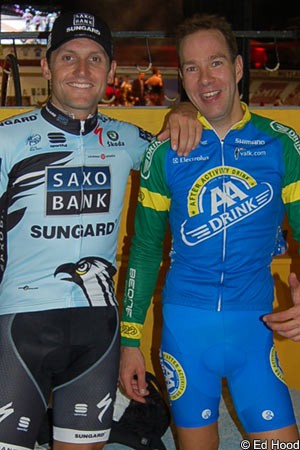Former Olympic champ comments on track racing, London Olympics, globalisation and more
 He’s a team pursuiter par excellence: an Olympic, two Commonwealth and three Worlds golds leave little room for argument on that score, and he’s also got individual pursuit medals silvers at Worlds level to boot. He’s also a strong road rider, and has just signed a new contract with the Saxo Bank SunGard team for 2012.
He’s a team pursuiter par excellence: an Olympic, two Commonwealth and three Worlds golds leave little room for argument on that score, and he’s also got individual pursuit medals silvers at Worlds level to boot. He’s also a strong road rider, and has just signed a new contract with the Saxo Bank SunGard team for 2012.
Luke Roberts has been a full time bike rider since he left school; he was a multiple Australian champion on the track as a junior and senior, with his first Commonwealth team pursuit gold coming in 1998 followed by his first Worlds gold in 2002; the same year as he netted another Commonwealth title in the event.
There was Worlds gold again in 2003 and 2004, with Olympic gold that year making it a full set of medals in this most technical of disciplines where only 60 kph plus will do.
But Robert’s ability isn’t restricted to the track; he’s been on European road teams since 2002 when he signed with German outfit Comnet where he spent three seasons.
He then spent a further three seasons – 2005/6/7 at the highest level with Bjarne Riis’s CSC team, riding the Tour de France.
Roberts was the man on David Zabriskie’s wheel when the American famously crashed almost within sight of the line in the TTT during the 2005 race, with his CSC team losing the test by a solitary ‘click’ of the second hand to Discovery.
The crash was, he says, a near miss for him too. “I was right on his wheel and stretching forward to change gear on the time trial ‘bars when he went down,” he recalls. “I got round him but then I had to try and get Basso and Julich – our GC riders, who were behind me – back up to the guys at the front.
“That was a 100% effort!”
After his time with the team, it was back to Germany and the Kuota squad for 2008/9. As a German resident it was no surprise that he remained with a ‘home’ team, Milram for 2010 but was caught up in the Pegasus fiasco when Milram folded.
Fortunately, there was a place for him with former employer, Bjarne Riis at Saxo Bank for 2011. And, despite his name being linked to GreenEdge for next year, he’ll be staying with Riis for 2012.
Among a varied palmares are a Tour of Normandie stage win in 2004; third on GC in the Tour of Bavaria in 2006; a similar GC position in the Tour of Britain in 2007; a Tour of Murcia stage win in 2010; the overall King of the Mountains in the Tour Down Under in 2011, plus the Six Days of Grenoble in 2009.
The Grenoble Six was where VeloNation caught up with the genial Australian to talk about ‘races to nowhere,’ the perils of being a professional bike rider and who’ll win the Olympic team pursuit in London next year.
VeloNation: How many six days have you ridden and which race do you like best?
Luke Roberts: I have ridden 17 six days to date (October 2011), for me Dortmund (no longer on the calendar) was always special as it was local – I had a lot of friends and family visit the race.
VN: Which was your first six day and what was it like?
LR: My first six day was Grenoble in 2002. It was a good race to start off with; Grenoble is a little easier-going than some of the six days.
VN: What’s the attitude of team management to your riding the sixes?
 LR: My Directors see the sixes as a positive addition to my winter training; track riding is good for bike handling skills and pedalling technique.
LR: My Directors see the sixes as a positive addition to my winter training; track riding is good for bike handling skills and pedalling technique.
VN: Do you ride much other track than the six days; outdoor meets in the summer for example?
LR: The only track meet I make it to regularly in the summer is the Six Day Night in Oberhausen-Rheinhausen, it’s great fun and reminds me of racing on the outdoor tracks as a kid in Australia.
VN: Will you continue to ride sixes once your ‘big team’ road career is at an end?
LR: I’ll continue to race professionally as long as I keep enjoying it; a six day career could carry on longer than a road career as it relies on skill and technique a little more than just what the legs have to say.
VN: What’s your take on the Grenoble format?
LR: Grenoble is an enjoyable six, it’s quite a relaxed program for the riders, there are loads of sprint events and some great show programs during the night. That gives us a few breaks so we can also sit back and enjoy the shows.
VN: Do you come out of a six tired or in good shape?
LR: A six day can be quite tiring, more so mentally as you need to keep a high level of concentration late into the night. It takes a couple of good sleeps after the event to freshen up. I don’t often ride back-to-back sixes.
VN: You have huge team pursuit experience…who’ll win it in London, and is sub 3:50 possible?
I think it’s going to be very tough to beat the Aussies in London. It’s a young group of guys that came in when the bar was set very high…they’ve already showed they can reach that level and will only improve up until the Games.
Based on the times ridden at the previous three Olympics on similar indoor velodromes we can expect a three second improvement on Beijing; sub 3:50 is possible.
VN: Milram must have been a disappointment? You signed but the team announced it was folding at year end.
LR: It was quite disappointing that Milram couldn’t continue, cycling in Germany has been through some tough times.
With the amount of new talent coming out of Germany now I think we’ll see things improve for the better soon.
VN: Can you tell us about Pegasus, please?
LR; It’s still not really clear to me what happened with Pegasus. It’s a bit of a chicken or egg story…the UCI required signed rider contracts in order for the team to apply for a license but us riders weren’t aware until it was too late that the team would fail to meet the other requirements.
 VN: You went back to Bjarne Riis for 2011 after the Pegasus debacle…
VN: You went back to Bjarne Riis for 2011 after the Pegasus debacle…
LR: After Pegasus failed to gain a license I contacted Bjarne. I spent three years with him at CSC and left on good terms. He was good enough to help me out of the situation I got stuck in.
VN: And you’ve re-signed for 2012…
LR: I’ve re-signed for another year at SaxoBank. It’s a great team, very well organised and always brings out the best from its riders.
VN: The word was that you were going to GreenEdge?
LR: I think every Australian riding professionally in Europe was linked with Greenedge at some stage.
VN: It must be hugely distracting having to worry about a new contract each winter?
LR: Contract negotiations are definitely not the nicest part about being a pro cyclist. There seems to be politics involved that shouldn’t be…it makes it frustrating.
VN: You were at the Tour of Beijing; what’s your take on ‘Mondialisation?’
LR: The Tour of Beijing was a well-run event, I think it’s great that the ‘World Tour’ is branching out to countries outside of Europe.
VN: What’s your opinion on the current UCI rider ranking points system?
LR: Personally I think the current ranking system has some flaws. It effectively projects the worth of the top few riders to huge amounts but leaves the smaller riders even more expendable and worth less.
I think it’s likely we’ll see less teamwork and more riders looking for their own results because of this.
VN: What goals do you still have in cycling?
LR: A Grand Tour stage win and an overall win at Tour Down Under are still on my list of to-do’s. Everything else I’ve pretty much crossed off.